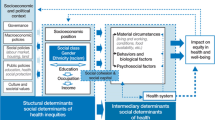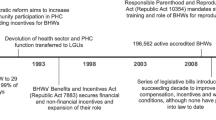Abstract
The promotor de salud, or community health worker (CHW) role, is highly feminized and little is known about how men view their participation in CHW programs. We conducted in-depth interviews with Latino men in North Carolina to explore this gap. We used systematic coding and display procedures informed by Grounded Theory to analyze the data. Men described their communities as lacking cohesion, making integration of Latino immigrants difficult. Most did not consider themselves leaders or feel they had leaders in their communities. Their perceptions of the feminized CHW role as well as the volunteer or low-paid nature of CHW work conflicted with men’s provider role. They also did not think they could perform the CHW role because they lacked education, skills, and broad networks. Efforts to increase male participation in CHW programs in new Latino immigrant destinations will need to understand and address these gender and migration-related dynamics in order to engage both women and men in improving the health of their communities.
Similar content being viewed by others
References
Passel, J. S., Cohn, D., & Lopez, M. H. (2011). Hispanics account for more than half of nation’s growth in past decade. Pew Hispanic Center http://Pewhispanic.Org/Files/Reports/140.Pdf
US Department of Health and Human Services. Health resources and services administration. bureau of health professions. (2007). Community Health Worker National Workforce Study.
WestRasmus, E. K., Pineda-Reyes, F., Tamez, M., & Westfall, J. M. (2012). Promotores de salud and community health workers: An annotated bibliography. Family & Community Health, 35(2), 172–182.
US Department of Health and Human Services. (2011). HHS action plan to reduce racial and ethnic health disparities: A nation free of disparities in health and health care.
Ingram, M., Sabo, S., Rothers, J., Wennerstrom, A., & de Zapien, J. G. (2008). Community health workers and community advocacy: Addressing health disparities. Journal of Community Health, 33(6), 417–424.
Squires, A., & O’Brien, M. J. (2012). Becoming a promotora a transformative process for female community health workers. Hispanic Journal of Behavioral Sciences, 34(3), 457–473.
Minkler, M., Garcia, A. P., Williams, J., LoPresti, T., & Lilly, J. (2010). Si se puede: Using participatory research to promote environmental justice in a Latino community in San Diego, California. Journal of Urban Health, 87(5), 796–812.
Sabo, S., Ingram, M., Reinschmidt, K. M., Schachter, K., Jacobs, L., Guernsey de Zapien, J., et al. (2013). Predictors and a framework for fostering community advocacy as a community health worker core function to eliminate health disparities. American Journal of Public Health, 103(7), e67–e73.
Stacciarini, J. R., Rosa, A., Ortiz, M., Munari, D. B., Uicab, G., & Balam, M. (2012). Promotoras in mental health: A review of English, Spanish, and Portuguese literature. Family & Community Health, 35(2), 92–102.
Lehmann, U., & Sanders, D. (2007). Community health workers: What do we know about them? The state of the evidence on programmes, activities, costs and impact on health outcomes of using community health workers. World Health Organization, 2, 1–42.
Casper, J. M., & Harrolle, M. G. (2013). Perceptions of constraints to leisure time physical activity among Latinos in Wake County, North Carolina. American Journal of Health Promotion, 27(3), 139–142.
Meyer, M. R. U., Sharkey, J. R., Patterson, M. S., & Dean, W. R. (2013). Understanding contextual barriers, supports, and opportunities for physical activity among Mexican-origin children in Texas border colonias: A descriptive study. BMC Public Health, 13(1), 14.
Dean, W. R., Sharkey, J. R., Johnson, C. M., & St John, J. (2012). Cultural repertoires and food-related household technology within colonia households under conditions of material hardship. International Journal for Equity in Health, 25, 1–13.
Rhodes, S. D., Foley, K. L., Zometa, C. S., & Bloom, F. R. (2007). Lay health advisor interventions among Hispanics/Latinos: A qualitative systematic review. American Journal of Preventive Medicine, 33(5), 418–427.
Ingram, M., Reinschmidt, K. M., Schachter, K. A., Davidson, C. L., Sabo, S. J., De Zapien, J. G., et al. (2012). Establishing a professional profile of community health workers: Results from a national study of roles, activities and training. Journal of Community Health, 37(2), 529–537.
Arvey, S. R., & Fernandez, M. E. (2012). Identifying the core elements of effective community health worker programs: A research agenda. American Journal of Public Health, 102(9), 1633–1637.
Walker, D. G., & Jan, S. (2005). How do we determine whether community health workers are cost-effective? Some core methodological issues. Journal of Community Health, 30(3), 221–229.
Ramirez-Valles, J. (1998). Promoting health, promoting women: The construction of female and professional identities in the discourse of community health workers. Social Science and Medicine, 47(11), 1749–1762.
Schulz, A. J., Freudenberg, N., & Daniels, J. (2006). Intersections of race, class, and gender in public health interventions. Gender, race, class and health: Intersectional approaches (pp. 371–393). San Francisco, CA: Jossey-Bass.
Riska, E. (2008). The feminization thesis: Discourses on gender and medicine. NORA—Nordic Journal of Feminist and Gender Research, 16(1), 3–18.
Alfaro-Trujillo, B., Valles-Medina, A. M., & Vargas-Ojeda, A. C. (2012). Profiles, perceptions and motivations of community health workers of NGOs in a border City of US-Mexico. Journal of Community Health, 37(3), 583–590.
Hawkins, J., Kieffer, E. C., Sinco, B., Spencer, M., Anderson, M., & Rosland, A. M. (2013). Does gender influence participation? Predictors of participation in a community health worker diabetes management intervention with African American and Latino adults. The Diabetes Educator, 39(5), 647–654.
Vissman, A. T., Eng, E., Aronson, R. E., Bloom, F. R., Leichliter, J. S., Montaño, J., et al. (2009). What do men who serve as lay health advisers really do?: Immigrant Latino men share their experiences as Navegantes to prevent HIV. AIDS Education and Prevention, 21(3), 220–232.
Rhodes, S. D., Hergenrather, K. C., Bloom, F. R., Leichliter, J. S., & Montaño, J. (2009). Outcomes from a community-based, participatory lay health advisor HIV/STD prevention intervention for recently arrived immigrant Latino men in rural North Carolina, USA. AIDS Education and Prevention, 21((5 Suppl)), 103.
Rhodes, S. D., Daniel, J., Alonzo, J., Duck, S., García, M., Downs, M., et al. (2013). A systematic community-based participatory approach to refining an evidence-based community-level intervention. The HOLA intervention for Latino men who have sex with men. Health Promotion Practice, 14(4), 607–616.
Perreira, K. M. (2011). Mexican families in North Carolina: The socio-historical contexts of exit and settlement. Southeastern Geographer, 51(2), 260–286.
US Census Bureau. (2012). American Fact Finder.
Gill, H. (2012). Latinos in North Carolina. A growing part of the state´s economic and social landscape. Perspectives on immigration. The Immigration Policy Center.
Charmaz, K. (2006). Constructing grounded theory: A practical guide through qualitative analysis. Thousand Oaks: Pine Forge Press.
Shields, S. A. (2008). Gender: An intersectionality perspective. Sex Roles, 59(5–6), 301–311.
Israel, B. A., Schulz, A. J., Parker, E. A., & Becker, A. B. (2001). Community-based participatory research: policy recommendations for promoting a partnership approach in health research. Education for Health, 14(2), 182–197.
Baquero, B., Goldman, S., Siman, F., Muqueeth, S., Villa-Torres, L., Eng, E., et al. (2014). Mi Cuerpo, Nuestra Responsabilidad: Using Photovoice to describe the assets and barriers to sexual and reproductive health among Latinos in North Carolina. Journal of Health Disparities Research and Practice, 7(1), 7.
Morse, J. M. (1995). The significance of saturation. Qualitative Health Research, 5(2), 147–149.
Scientific Software Development GmbH. (2013). Atlas.ti 7
Worthington, C., Este, D., Strain, K., & Huffey, N. (2013). African immigrant views of HIV service needs: Gendered perspectives. AIDS Care, 25(1), 103–108.
Broughton, C. (2008). Migration as engendered practice: Mexican men, masculinity, and Northward migration. Gender & Society, 22(5), 568–589.
Grzywacz, J. G., Quandt, S. A., Early, J., Tapia, J., Graham, C. N., & Arcury, T. A. (2006). Leaving family for work: ambivalence and mental health among Mexican migrant farmworker men. Journal of Immigrant and Minority Health, 8(1), 85–97.
Mirandé, A., Pitones, J. M., & Díaz, J. (2011). Quien Es El Mas Macho?: A comparison of day laborers and Chicano men. Men and Masculinities, 14(3), 309–334.
Viruell-Fuentes, E. A., Morenoff, J. D., Williams, D. R., & House, J. S. (2013). Contextualizing nativity status, Latino social ties, and ethnic enclaves: An examination of the ‘immigrant social ties hypothesis’. Ethnicity & Health, 18(6), 586–609.
Documėt, P. I., Kamouyerou, A., Pesantes, A., Macia, L., Maldonado, H., Fox, A.,… Boyzo, R. (2013). Participatory assessment of the health of Latino immigrant men in a community with a growing Latino population. Journal of Immigrant and Minority Health, 1–9.
Acknowledgments
We want to thank the financial support from the Latino Migration Project at UNC, the Community Engagement Fellowship by the Carolina Center for Public Service, and the Institute for Global Initiatives at UNC. Lastly, LVT wants to thank the doctoral training funding support from the Consejo Nacional de Ciencia y Tecnologia (CONACYT) from the Mexican Government. We also want to thank several people that participated during the whole process of the research. First and most to all the men that participated in the interviews. The promotoras that helped us with the conceptualization of the project and the recruitment of participants. Chelly Richards, MPH, who participated during the whole research process and conducted one of the interviews. El Pueblo, Inc. and Florence Siman, Health Programs Director of that institution, for their support for this project.
Author information
Authors and Affiliations
Corresponding author
Rights and permissions
About this article
Cite this article
Villa-Torres, L., Fleming, P.J. & Barrington, C. Engaging Men as Promotores de Salud: Perceptions of Community Health Workers Among Latino Men in North Carolina. J Community Health 40, 167–174 (2015). https://doi.org/10.1007/s10900-014-9915-x
Published:
Issue Date:
DOI: https://doi.org/10.1007/s10900-014-9915-x




